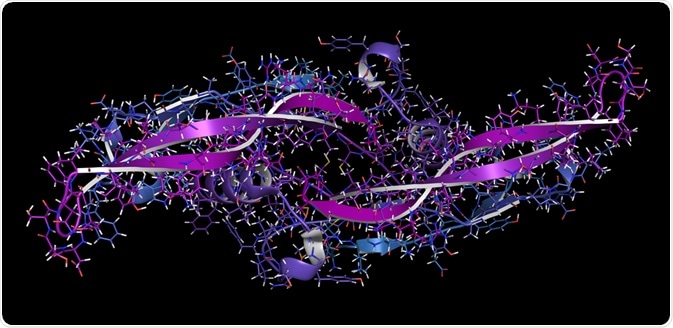Recombinant proteins are formed by transfecting foreign genes into a host cell. Recombinant proteins are commonly used to produce pharmaceutical products, protein-based polymers for drug delivery, antibodies and enzymes for disease treatment, protein scaffolds for tissue engineering, as well as for a myriad of other uses.
 molekuul_be | Shutterstock
molekuul_be | Shutterstock
How did the idea of recombinant protein emerge?
Recombinant proteins were proposed by Peter Lobban who was the first person to produce and replicate recombinant DNA in 1972 and 1973. The recombinant DNA is created by fusing sequences that may not be normally present in an organism. However, it is still possible to change and re-insert a modified DNA as different organisms share same structure of DNA.
This altered DNA is introduced into a host cell, after which it can be replicated without expression, or it may be transcribed and translated leading to the formation of a recombinant protein. In many cases, additional sequences (such as promoter or translation initiation signals) may be required to induce the expression of recombinant DNA.
Expression of recombinant proteins
The strategy for expressing recombinant protein involves transfecting a particular cell with DNA vector containing the template of recombinant DNA. The cells containing the template are then cultured, so that they can transcribe and translate the protein of interest.
These cells can then be lyzed or broken to release the formed protein which is then subjected to purification methods. The systems that are used to express the recombinant DNA include both prokaryotic and eukaryotic systems. Often this choice is based on the protein type, functional activity, as well as the required yield that is required.
Mammalian systems
Mammalian systems are used to perform functional assays, structural analysis, antibody production, protein interaction, production of viruses, etc. A main advantage of this system is either transient or stable production of proteins.
Furthermore, the system has been optimized for both rapid and high yield of producing proteins. However, the disadvantages include the need for large yields (such as gram/litre) in case of suspension cultures. Also, the cell culture conditions are more demanding in this case.
Insect system
This system is used to perform functional assays, structural analysis, expressing intracellular proteins and protein complexes, production of viruses, etc. The processing methods in this case are similar to the methods to process proteins in mammalian systems. However, in this system, the cell culture conditions are more demanding than culturing prokaryotic cells. Also, producing the recombinant vectors is time-consuming in insect systems.
Yeast system
This system is used to perform structural analysis, functional assays, generation of antibodies, but also to study protein interactions. This system can be used to process eukaryotic proteins and is scalable up to fermentation. The media requirements are also simple in this case. However, for generating very high yields, fermentation is required and growth conditions often need to be optimised.
Bacterial system
Bacterial system can also be used to make structural and functional assays. It is scalable, low-cost, and requires relatively simple media conditions. However, some mammalian proteins may be difficult to express in this case.
Algal system
This system is used to study photosynthesis, plant biology and metabolism. One of the big advantages is that it can be used to genetically modify and express systems for photosynthetic microalgae. Moreover, it can also provide good experimental controls for producing biofuel and nutraceuticals. However, this is still a nascent platform and is less developed when compared to some of the other systems.
Cell-free system
This system is used to study toxic proteins, incorporation of unnatural amino acids, screening of translational inhibitors etc. Since this is an open system, it is possible to add unnatural components. Also, the expression is fast and simple. However, scaling the production of recombinant protein above multi-milligram quantities may be expensive and cumbersome.
Last Updated: Mar 28, 2019